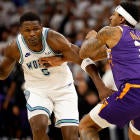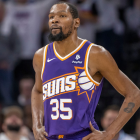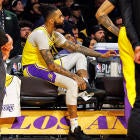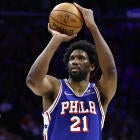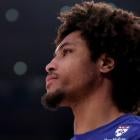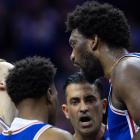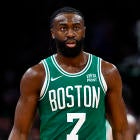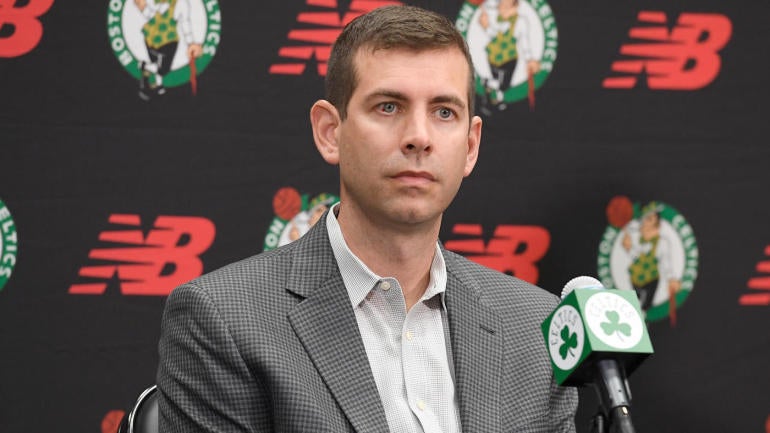
Trading for superstars is typically an aspirational exercise. You draft well, hoard picks and make your franchise appealing enough to maybe, one day have the opportunity to add a franchise player. But in the not-too-distant past, the Boston Celtics under Danny Ainge had such an enormous asset advantage that they felt they could afford to be picky about which superstars they targeted. They seemingly passed on opportunities to swipe Jimmy Butler, Paul George and Kawhi Leonard at reasonable prices in part to preserve the trade chips they would one day need to acquire Anthony Davis, who, of course, would prove uninterested in wearing green.
As they waited, their assets depreciated. The picks the Celtics made lost value because there were too many of them for the majority to actually receive playing time. The picks they held lost value because the teams they originally belonged to improved. The All-Stars they already had left en masse. Kemba Walker was signed to replace them, but two years later, his health had deteriorated so rapidly that a first-round pick had to be attached to him just to trade him for Al Horford back.
Now, with Brad Stevens at the helm, the stockpile is gone. Jayson Tatum and Jaylen Brown have graduated from trade bait status into bona fide, in-their-prime stars, but Boston no longer has the draft picks or the surplus of young talent needed to supplement them. After years of turning away gettable stars, the Celtics are now just like everybody else: desperate for players that they might no longer have access to.
That's an enormously frustrating position for a team to find itself in right as a superstar who could potentially have interest in hopping aboard nears availability. Bradley Beal has not yet requested a trade. Such a request could come in the near future, but even if it doesn't, Beal can become a free agent next offseason. Resolution on his future is approaching, and on paper, Boston appears to be a strong fit. Beal and Tatum are lifelong friends having both grown up in St. Louis, and when Tatum saw an Instagram post about Beal trade rumors, he didn't exactly hide his interest in a partnership.
Jayson Tatum speaking pretty clearly about Bradley Beal and what he wants #Celtics pic.twitter.com/gzMA8WPuVq
— Tim Sheils (@timsheilsnba) July 24, 2021
Boston probably could land Beal through a trade by making Brown available, but that would defeat the entire purpose of a deal. The current, two-star Celtics aren't championship contenders, and such a swap would be a fairly modest upgrade. Making a trade without Brown almost certainly won't be possible. Even if the Celtics were willing to give Washington the sort of all-in draft picks-based package the Brooklyn Nets gave the Houston Rockets for James Harden, the Wizards probably wouldn't take it. Brooklyn's future picks had value because Harden, Kevin Durant and Kyrie Irving are all nearing the end of their primes. Durant is 32 right now. Tatum will be 30 in 2028, the last year Boston can legally trade a first-round pick this offseason. The Celtics are too young to entice the Wizards that way. Barring something unforeseen, Boston has no clear path to trading its way into a Tatum-Brown-Beal trio.
The now-ubiquitous pre-agency period of the player empowerment era has, in many instances, made trading a necessity. Stars exert so much pressure before they reach free agency that their situations are usually solved by the time free agency actually arrives, yet Beal's unique circumstances suggest that his case might be a bit more traditional. Davis pushed for his trade a year-and-a-half prior to the expiration of his contract. Beal has a year to go and no request has been made. He plays for a franchise that is notoriously averse to tanking and is coming off a season that was severely negatively impacted by COVID-19. Beal's loyalty to Washington is well known. Even if he's leaving the Wizards eventually, there isn't yet reason to believe that such a move would be immediate. The Russell Westbrook-led supporting cast helped Washington win 18 of its last 25 regular-season games. If Beal wants to give that group one last chance, free agency suddenly becomes a viable path to his acquisition.
That would significantly complicate matters for certain suitors. The Golden State Warriors, for instance, are not only too far above the cap to feasibly create max space in 2022, but would likely struggle to even fit Beal under the hard cap that a sign-and-trade would induce unless Klay Thompson or Draymond Green was involved in the deal. The one benefit to having lost as many players as Boston has is that it has, for now, left the Celtics with a fairly clean cap sheet.
Tatum's max contract extension is set to begin next season, but because he missed out on an All-NBA selection, he had to settle for 25 percent of the cap as his starting salary rather than the 30 percent he would have been eligible for as an All-NBA player under the Derrick Rose Rule. Brown, signed before he grew into a star, isn't making any version of the max. Even with possible incentives factored in, he and Tatum will combine to make roughly $59 million in the 2022-23 season -- slightly more than half of the projected $115.8 million cap for that offseason. Not all two-star teams are created equal. Washington, for example, is set to pay Beal and Westbrook almost $79 million this season.
Boston has very little dead weight on its books beyond the two stars. That was, in part, the motivation for the Walker trade. He is owed over $37 million for the 2022-23 season. Horford has a $26.5 million cap figure for that offseason, but only $14.5 million of that is guaranteed. If Boston could clear the decks beyond that dead money and its two stars, it could still get reasonably close to the max. As a 10-year veteran, Beal will be eligible for a projected salary of roughly $40.5 million in the summer of 2022. Boston could get to almost $33 million with just Tatum, Brown and the waived portion of Horford's money accounted for. That's not the max, of course, but if the Celtics could get him in the door on a one-year deal with a player option afterward, they could use his Non-Bird rights to bump him up to above $39 million in 2023 on a long-term deal.
The Celtics' ideal scenario would obviously not involve dead Horford money, though. That's where their picks become more valuable. Attaching one or two to trade Horford into another team's cap space (perhaps, ironically, Oklahoma City's) is fairly realistic. At that point, keeping some of the young players currently in place would be feasible. Boston has four former first-round picks that will still be on rookie deals by that point, and their team options for the 2022-23 season are so cheap that, without Horford, keeping all of them along with the non-guaranteed deal of young big man Moses Brown wouldn't prevent the Celtics from coming close to max cap space next offseason.
| Player | Salary |
|---|---|
Jayson Tatum | $30,351,780 |
Jaylen Brown | $28,741,071* |
$5,634,257 | |
$4,306,281 | |
$3,804,360 | |
$2,239,200 | |
Moses Brown | $1,846,738 |
Demetrius Jackson (dead money) | $92,857 |
Incomplete roster charges (six) | $4,765,060 |
Total salary | $81,781,604 |
Projected cap space | $34,005,022 |
*Includes $2,071,428 in likely incentives, per Spotrac.
Again, this is short of the max, but we're in stone's throw territory. Get off of Langford or some combination of the others and they're basically there. Boston could preemptively decline its team options, as decisions are due early next season, but there's no point at such low cap figures. Those deals are all moveable without much pain.
The pain would come this offseason, and Boston's willingness to endure it will say quite a bit about its long-term ambitions. Planning for cap space is a multi-year endeavor that involves letting go of immediate contributors in the hopes that the space their absence creates can yield something better. If the Celtics want to create max cap space next offseason, they're going to have to let go of Evan Fournier this offseason. They won't be able to sign a mid-level replacement to a long-term deal either unless they're confident they can trade that player next summer. No rookie extension for Robert Williams would be possible in this scenario either. Marcus Smart is a 2022 free agent, so Boston could delay a long-term decision on his status for now, but any scenario in which it signs a max player would mean renouncing his cap hold and letting him walk as well.
Those are the stakes of playing the cap space game. Boston would be weakening itself right now by letting Fournier go. It would be inviting locker room tension by forcing key contributors this season to play for contracts next summer -- an approach that didn't go particularly well during the 2018-19 campaign. It would be doing all of this on a prayer. It might yield Beal or another star.
But there's a good chance that it doesn't. Beal could ask for his trade in the middle of the season, or the Wizards could proactively move him without a request at the deadline if they sense their long-term hope is lost. He could decide that Washington is where he wants to spend his entire career. He could reach free agency and choose a different team. There are alternatives available to Boston if that's the case. Zach LaVine is currently playing with Tatum on Team USA, for instance, and while Chicago could renegotiate and extend him up to the max this offseason, doing so would deprive the Bulls of the cap space they'd need to properly surround him with a winning roster (which I explained in more depth here). There's a good chance he will be a free agent as well next summer.
It's just exceedingly rare that any team enters free agency feeling particularly strongly about its chances at landing a star. Like a star trade, signing one outright is aspirational. It's something that's unlikely even after a team has committed several years to the pursuit. Boston was, at one time, too risk-averse to trade for Kawhi Leonard. That's not the sort of team that typically punts away entire seasons on the hope that doing so could eventually bear fruit in free agency.
Next season might be a lost cause regardless, though. Fournier is a good player, but the last team to commit starter money to him for multiple years has zero playoff series wins to show for it. Williams has enormous upside, but if Stevens expected him to reach it, he likely would have played him more than 19 minutes per game as Boston's coach last season. Smart is the heart of a team that has already lost several other vital organs. The practical cost here isn't enormous. The Celtics aren't breaking up a surefire contender to chase a dynasty, but contention is a fairly nebulous concept.
The Phoenix Suns proved that by reaching the Finals this season. The Suns weren't a traditional super team. They had two All-Stars and the perfect supporting cast. They got the right breaks and came two wins away from a championship. There's an argument in favor of that blueprint through its sheer attainability. Boston already has two All-Stars. The Celtics made the Eastern Conference finals in three of the four seasons prior to 2021 and could credibly claim that COVID-19 derailed their season. An organic bounce-back season might be in the cards. They have role players who could become champions under the right circumstances.
But waiting for those circumstances is part of what got Boston into this mess in the first place. Its chance at a dynasty might have been squandered by waiting too long to be this aggressive. Its margin for error is gone. The Celtics can no longer afford to be greedy. They can have something resembling their current roster and try to be opportunistic with minimal assets down the line, or they can start planning their big swing right now with the understanding that they could very well miss entirely. That's a risk Boston tried to avoid under Ainge. It's one it might need to take to get back into the championship picture under Stevens.














